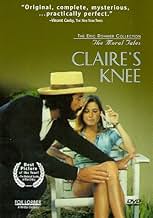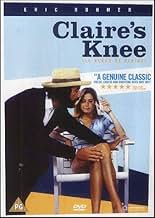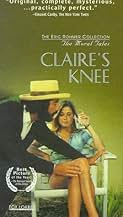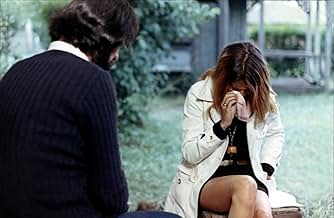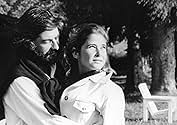CALIFICACIÓN DE IMDb
7.5/10
13 k
TU CALIFICACIÓN
En sus vacaciones de verano junto al lago, un hombre conflictivo se atreve a coquetear con dos hermanastras adolescentes a pesar de estar comprometido con la hija de un diplomático y de que ... Leer todoEn sus vacaciones de verano junto al lago, un hombre conflictivo se atreve a coquetear con dos hermanastras adolescentes a pesar de estar comprometido con la hija de un diplomático y de que las chicas han salido.En sus vacaciones de verano junto al lago, un hombre conflictivo se atreve a coquetear con dos hermanastras adolescentes a pesar de estar comprometido con la hija de un diplomático y de que las chicas han salido.
- Premios
- 6 premios ganados y 4 nominaciones en total
- Dirección
- Guionista
- Todo el elenco y el equipo
- Producción, taquilla y más en IMDbPro
Opiniones destacadas
I think the moral point of "Claire's Knee" (probably not Rohmer's) is that Jerome's conversion from womanizer to a serious and challenging relationship with Lucinde, is flawed. And that the flaw is his invoking the escape hatch of an "open marriage." He (or his new persona) half believes that he will not use it, but the accidental presence of two enticing teenagers at his Lake Annecy vacation sets the stage for his self-delusion, his devaluation of intimacy, and for the resurfacing of his sensuous ways.
For "open marriage" as a cover for "adult," is really another form of ambivalence and duplicity. What it means to Jerome is that the door of puerile fantasy is at his fingertips. Thus in the rarified air of Annecy, in the flow of summer, thin, mod teenagers Laura and Claire become not only sex objects to Jerome, but potential love partners--one at 16, assessed as adult enough, and the other 18, assessed as legal. We see them together, he invariably clothed for late autumn weather, they for mid-summer. In the emotional cat and mouse games that ensue, Laura and Claire are, to him, mere temptresses, and perhaps part of a self-test, and not, in any sense, young women with lives of their own & chosen boy friends. Instead, their boundaries begin to blur under his voyeurism, his not so subtle acts of aggression, his familiar touching, fondling, pointed remarks, and prescriptive suggestions. He offers them no affection, no friendship, and no communication.
How could it be otherwise given their demure youth, beauty and his permissive "open marriage," and when possessing them is his goal--pederasty and fetishism his means. But his fling with inspiring youth having fulfilled his KNEEDS, he can now discard Laura and Claire without in any way having deviated from his new mature male role-- as willfully possessive as he's been. Whether Lucinde has actually signed off on the "open" deal or not, she, despite her maturity, worldly success, and her sculptured character, must be no more than a symbol to Jerome, extracted for his KNEEDS, which must come first before commitment and support.
For "open marriage" as a cover for "adult," is really another form of ambivalence and duplicity. What it means to Jerome is that the door of puerile fantasy is at his fingertips. Thus in the rarified air of Annecy, in the flow of summer, thin, mod teenagers Laura and Claire become not only sex objects to Jerome, but potential love partners--one at 16, assessed as adult enough, and the other 18, assessed as legal. We see them together, he invariably clothed for late autumn weather, they for mid-summer. In the emotional cat and mouse games that ensue, Laura and Claire are, to him, mere temptresses, and perhaps part of a self-test, and not, in any sense, young women with lives of their own & chosen boy friends. Instead, their boundaries begin to blur under his voyeurism, his not so subtle acts of aggression, his familiar touching, fondling, pointed remarks, and prescriptive suggestions. He offers them no affection, no friendship, and no communication.
How could it be otherwise given their demure youth, beauty and his permissive "open marriage," and when possessing them is his goal--pederasty and fetishism his means. But his fling with inspiring youth having fulfilled his KNEEDS, he can now discard Laura and Claire without in any way having deviated from his new mature male role-- as willfully possessive as he's been. Whether Lucinde has actually signed off on the "open" deal or not, she, despite her maturity, worldly success, and her sculptured character, must be no more than a symbol to Jerome, extracted for his KNEEDS, which must come first before commitment and support.
Well, I came across this movie while reading Roger Ebert's Awake in the dark and thankfully was able to get a chance to get a hold of Éric Rohmer's masterpiece Claire's Knee. I hadn't read Ebert's review (usually I watch a movie before going through the reviews) so was not sure what was I going into - haven't watched any trailer as well so I was not sure what this would be about, but with my experience with foreign movies I was sure it would be good and I guessed by the name that it suggested something like Lolita or many other movies based on such abnormal (sometimes immoral) desires.
So, when you start with the movie you are somewhat aware where this is going - the expected storyline basis the title- but soon comes to these well-performed characters and while getting engrossed in the discussions between characters on love, choices, life, etc. you get more understanding on the way each of them sees the world - what they desire? what they like? and why they do so? The great part with such discussion was that first, it didn't go into a preachy tone- that x is right and y is not, each of them had their views which they justified by their past or by their behavior - it reminded me of the Before trilogy and, second, while listening to such great lines, one start thinking and contemplating of one's own stand on the topic of love, moral & desires.
There is a scene where the protagonist talks about a notion where he as a person do not have desires on the beauty aspect of women but because of a character his friends ask him to play, he started thinking like that character, and somewhere knowingly or unknowingly he too as a person starts to have those desires. The beauty of this notion is that this happens to the viewer as well, you don't look at claire's knee or her in that sense- but because the movie tells you that this is important - this is beautiful - and to be desired you look for it in that passionate way. You too, play the character in the movie.
So, when you start with the movie you are somewhat aware where this is going - the expected storyline basis the title- but soon comes to these well-performed characters and while getting engrossed in the discussions between characters on love, choices, life, etc. you get more understanding on the way each of them sees the world - what they desire? what they like? and why they do so? The great part with such discussion was that first, it didn't go into a preachy tone- that x is right and y is not, each of them had their views which they justified by their past or by their behavior - it reminded me of the Before trilogy and, second, while listening to such great lines, one start thinking and contemplating of one's own stand on the topic of love, moral & desires.
There is a scene where the protagonist talks about a notion where he as a person do not have desires on the beauty aspect of women but because of a character his friends ask him to play, he started thinking like that character, and somewhere knowingly or unknowingly he too as a person starts to have those desires. The beauty of this notion is that this happens to the viewer as well, you don't look at claire's knee or her in that sense- but because the movie tells you that this is important - this is beautiful - and to be desired you look for it in that passionate way. You too, play the character in the movie.
Like most of Eric Rohmer's work, you will either enjoy the laid-back atmosphere and chatty characters in Claire's Knee, or find it all incredibly boring. I happen to love them. It's rare to find movies that don't want to be sensationalistic and violent, but would rather present universal questions and then investigate them throughout the course of the movie.
I would recommend Love in the Afternoon as an entry into Rohmer however, as it is a little more pacey for those unfamiliar with his style. And my personal favourite is "The Green Ray"... but don't start there as the subject of the film is about boredom!
I would recommend Love in the Afternoon as an entry into Rohmer however, as it is a little more pacey for those unfamiliar with his style. And my personal favourite is "The Green Ray"... but don't start there as the subject of the film is about boredom!
After a dispiriting encounter with THE COLLECTOR (1967), the fourth number of Rohmer's SIX MORAL TALES, I feel elated that the fifth entry CLAIRE'S KNEE has rekindled my passion in Rohmer's body work, his superlative insight as regards self-boosting pretension over real agenda inward has reached a high-point in this basically nothing-has-happened miniature.
A high-flying diplomat Jérôme (Brialy) has returned to Lake Annecy to sell his family house, one month prior his wedding, he will marry the woman who he has an on-and-off relationship over 6 years. By sheer chance, he meets his old friend, the novelist Aurora (Cornu), who has lodged in Madame Walter's (Montel) lake house at the foot of the mountain nearby, to finish her latest novel.
While the two reminisce about the past and update each other with information of the intervening years, Aurora is slightly agape to know that Jérôme decides to tie the knot, in her view, he is not a marrying type, but Jérôme claims that he and her fiancée has reached a perfectly and mutually understanding phrase - an open relationship as long as there is nothing too serious to undercut their marriage, which implies that two-timing is not a problem at all.
Later Aurora introduces Jérôme to Madame Walter and her teenage daughter Laura (Romand), who, strikes up a crush on Jérôme. Aurora is stuck in writer's block, so Jérôme volunteers to be her guinea pig, to explore the situation with Laura, then reports back to Aurora with all the details. Laura is genial, precocious, coruscating with contradictory ideas (the love/dispute relation with her mother, bored/fascinated by the picturesque scenery), she is not afraid to admit her feelings for Jérôme, but when the latter attempts a wet kiss, she brushes him aside, teases that she wants to be totally in love, not with a soon-to-be-married man, yet the truth is that she will embark on her study in Britain, sooner than Jérôme's due date.
Jérôme enjoys Laura's company, takes her mountain hiking and riding in his motorboat, tries to cop a feel when timing is proper and fails epically, but how can any man not lap up the gratifying feeling of being the receiving end of a teenage girl's passing fancy?, although Laura's candid sophistication is something saps him of any further actions. However, before soon, Laura is no longer his main focal point, because Claire (de Monaghan), Laura's slightly older half-sister, a sultrier blonde arrives, so is her boyfriend, a muscle-showboating jock Gilles (Falconetti). Jérôme involuntarily develops a fetish for Claire's knee, tender, smooth and immensely arousing for his taste, he confesses to Aurora, and takes the ultimate task: to touch Claire's knee under her full consent.
So, obviously Gilles is the weak point to achieve his mission, expressing to Claire that she can find someone much better than Gilles is a stock line from a sour man who is not even qualified for competition, but insidiously avenges to break up a seemingly matched couple on a shaky pretext, it doesn't work usually, as the heart wants what its wants, there is always some behind-the-closed- door magic potion can retain a relationship, so who would take an onlooker's subjective opinion seriously, especially he is a total stranger? However, Jérôme seizes a golden opportunity, dismantles Claire's defence by aiming her Achilles heel, a young girl's intuitive insecurity, and he accomplishes his task, almost grotesquely surreal, during those time-still minutes, a whimpering Claire glances at Jérôme, whose hand is continuing rubbing her knee, she seems baffling but doesn't care to stop since it seems to be an innocuous gesture, still, in the eyes of a beholder, a latent sexual tension has reached its breaking point.
In Jérôme's self-satisfactory version, his act is bold but meritorious, not only he fulfils his primal desire, it is also beneficial for Claire, to save her from the hands of a philander, so, he leaves with triumphant brio to his approaching wedding. Aurora stays, and in the end, from her eyes, we see what happens afterwards between Claire and Gilles, it is a far cry from what Jérôme has envisioned. It is all mapped out under Rohmer's master-plan, one's shallow and subjective vision versus what happens in reality, most of time, we are prone to feel conceited by our own judgment and perception, yet, most of it is indeed a fanciful illusion, a bubble masterfully bursts under the strikingly scenic palette and a spare cast.
The acting is above-par, a heavy-bearded Jean-Claude Brialy effortlessly alternates between a welcoming rapport with an amateurish Aurora Cornu (the Romanian-born French writer, who visibly glimpses into the camera many a time and inclines to speak her lines with eyes zooming in on the floor, but those tics doesn't impede the narrative, on the contrary it renders a vérité feel), an engaging and heart-to-heart communication with the newcomer Béatrice Romand, and his voyeuristic limerence with an attractive but vapidly uninterested Laurence de Monaghan. Told in a style of visualising diary entries in a one-month span, CLAIRE'S KNEE is mostly about talking, and talking could be tedious or overbearing, or sometime both, it all depends on who's talking, and how do the repercussions pan out, here Rohmer has found his feet and to say the least, the film is an undeniable acme in Rohmer's awe-inspiring oeuvre, a significant cultural legacy bequeathed to all mankind.
A high-flying diplomat Jérôme (Brialy) has returned to Lake Annecy to sell his family house, one month prior his wedding, he will marry the woman who he has an on-and-off relationship over 6 years. By sheer chance, he meets his old friend, the novelist Aurora (Cornu), who has lodged in Madame Walter's (Montel) lake house at the foot of the mountain nearby, to finish her latest novel.
While the two reminisce about the past and update each other with information of the intervening years, Aurora is slightly agape to know that Jérôme decides to tie the knot, in her view, he is not a marrying type, but Jérôme claims that he and her fiancée has reached a perfectly and mutually understanding phrase - an open relationship as long as there is nothing too serious to undercut their marriage, which implies that two-timing is not a problem at all.
Later Aurora introduces Jérôme to Madame Walter and her teenage daughter Laura (Romand), who, strikes up a crush on Jérôme. Aurora is stuck in writer's block, so Jérôme volunteers to be her guinea pig, to explore the situation with Laura, then reports back to Aurora with all the details. Laura is genial, precocious, coruscating with contradictory ideas (the love/dispute relation with her mother, bored/fascinated by the picturesque scenery), she is not afraid to admit her feelings for Jérôme, but when the latter attempts a wet kiss, she brushes him aside, teases that she wants to be totally in love, not with a soon-to-be-married man, yet the truth is that she will embark on her study in Britain, sooner than Jérôme's due date.
Jérôme enjoys Laura's company, takes her mountain hiking and riding in his motorboat, tries to cop a feel when timing is proper and fails epically, but how can any man not lap up the gratifying feeling of being the receiving end of a teenage girl's passing fancy?, although Laura's candid sophistication is something saps him of any further actions. However, before soon, Laura is no longer his main focal point, because Claire (de Monaghan), Laura's slightly older half-sister, a sultrier blonde arrives, so is her boyfriend, a muscle-showboating jock Gilles (Falconetti). Jérôme involuntarily develops a fetish for Claire's knee, tender, smooth and immensely arousing for his taste, he confesses to Aurora, and takes the ultimate task: to touch Claire's knee under her full consent.
So, obviously Gilles is the weak point to achieve his mission, expressing to Claire that she can find someone much better than Gilles is a stock line from a sour man who is not even qualified for competition, but insidiously avenges to break up a seemingly matched couple on a shaky pretext, it doesn't work usually, as the heart wants what its wants, there is always some behind-the-closed- door magic potion can retain a relationship, so who would take an onlooker's subjective opinion seriously, especially he is a total stranger? However, Jérôme seizes a golden opportunity, dismantles Claire's defence by aiming her Achilles heel, a young girl's intuitive insecurity, and he accomplishes his task, almost grotesquely surreal, during those time-still minutes, a whimpering Claire glances at Jérôme, whose hand is continuing rubbing her knee, she seems baffling but doesn't care to stop since it seems to be an innocuous gesture, still, in the eyes of a beholder, a latent sexual tension has reached its breaking point.
In Jérôme's self-satisfactory version, his act is bold but meritorious, not only he fulfils his primal desire, it is also beneficial for Claire, to save her from the hands of a philander, so, he leaves with triumphant brio to his approaching wedding. Aurora stays, and in the end, from her eyes, we see what happens afterwards between Claire and Gilles, it is a far cry from what Jérôme has envisioned. It is all mapped out under Rohmer's master-plan, one's shallow and subjective vision versus what happens in reality, most of time, we are prone to feel conceited by our own judgment and perception, yet, most of it is indeed a fanciful illusion, a bubble masterfully bursts under the strikingly scenic palette and a spare cast.
The acting is above-par, a heavy-bearded Jean-Claude Brialy effortlessly alternates between a welcoming rapport with an amateurish Aurora Cornu (the Romanian-born French writer, who visibly glimpses into the camera many a time and inclines to speak her lines with eyes zooming in on the floor, but those tics doesn't impede the narrative, on the contrary it renders a vérité feel), an engaging and heart-to-heart communication with the newcomer Béatrice Romand, and his voyeuristic limerence with an attractive but vapidly uninterested Laurence de Monaghan. Told in a style of visualising diary entries in a one-month span, CLAIRE'S KNEE is mostly about talking, and talking could be tedious or overbearing, or sometime both, it all depends on who's talking, and how do the repercussions pan out, here Rohmer has found his feet and to say the least, the film is an undeniable acme in Rohmer's awe-inspiring oeuvre, a significant cultural legacy bequeathed to all mankind.
There's a lot to enjoy in Claire's Knee: the relaxed easy pace, the charming characters, the warm and insightful conversations, the stunning scenery of the French Alps.
Unfortunately I can't find any way to identify or empathize with a world that is so comfortable, so boring, so unambiguous, and ultimately, so superficial. None of the characters seem to work; no-one ever seems anxious or troubled; nothing particularly bad or good happens, or seems likely to ever happen. It's a film of low-level emotions, and low stakes -- for the characters, and for the viewers.
In this bland world, the only question of importance becomes: will the main character, a man of 35 or older, seduce one of the two teenage beauties? No particularly momentous moral calculus is involved, and ultimately the stakes were so low that I could not bring myself to care. The character is good man, or he's a lecher, or he's neither...but I feel Rohmer did not give me any reason why any of this might matter.
Claire's Knee is a hymn of praise to French charm, bourgeois comforts, and inconsequential easy pleasures. If that's your thing, enjoy yourself with this film. Me, I'll be over there in the corner, watching films by directors that ask harder questions.
Unfortunately I can't find any way to identify or empathize with a world that is so comfortable, so boring, so unambiguous, and ultimately, so superficial. None of the characters seem to work; no-one ever seems anxious or troubled; nothing particularly bad or good happens, or seems likely to ever happen. It's a film of low-level emotions, and low stakes -- for the characters, and for the viewers.
In this bland world, the only question of importance becomes: will the main character, a man of 35 or older, seduce one of the two teenage beauties? No particularly momentous moral calculus is involved, and ultimately the stakes were so low that I could not bring myself to care. The character is good man, or he's a lecher, or he's neither...but I feel Rohmer did not give me any reason why any of this might matter.
Claire's Knee is a hymn of praise to French charm, bourgeois comforts, and inconsequential easy pleasures. If that's your thing, enjoy yourself with this film. Me, I'll be over there in the corner, watching films by directors that ask harder questions.
¿Sabías que…?
- TriviaNot counting a picture frame seen from a distance, the title character's first appearance takes place 47 minutes into the film.
- ErroresNear the end of the movie, Jerôme and Claire Annecy are going by boat to Annecy but must seek refuge under a shelter because of a storm. During their conversation, the irregular flow of the watering device used to create the big rain can be heard clearly.
- ConexionesEdited into 365 days, also known as a Year (2019)
Selecciones populares
Inicia sesión para calificar y agrega a la lista de videos para obtener recomendaciones personalizadas
- How long is Claire's Knee?Con tecnología de Alexa
- What are the names of all six of Rohmer's moral tales?
Detalles
Taquilla
- Total a nivel mundial
- USD 5,112
- Tiempo de ejecución1 hora 45 minutos
- Mezcla de sonido
- Relación de aspecto
- 1.37 : 1
Contribuir a esta página
Sugiere una edición o agrega el contenido que falta

Principales brechas de datos
What is the Canadian French language plot outline for Le genou de Claire (1970)?
Responda
![Ver Bande-annonce [OV]](https://m.media-amazon.com/images/M/MV5BMTgyOTk2NmMtZTk3ZS00Yjg4LWIwMzEtM2RmZDQ0ZWVhZWUzXkEyXkFqcGdeQXRyYW5zY29kZS13b3JrZmxvdw@@._V1_QL75_UY281_CR10)

